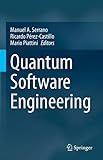Quantum Software Engineering [electronic resource] /
Material type: TextPublisher: Cham : Springer International Publishing : Imprint: Springer, 2022Edition: 1st ed. 2022Description: XXVIII, 302 p. 141 illus., 89 illus. in color. online resourceContent type:
TextPublisher: Cham : Springer International Publishing : Imprint: Springer, 2022Edition: 1st ed. 2022Description: XXVIII, 302 p. 141 illus., 89 illus. in color. online resourceContent type: - text
- computer
- online resource
- 9783031053245
- 005.1 23
- QA76.758
1 Elías F. Combarro, Quantum Computing Foundations -- 2 Mario Piattini and Juan Manuel Murillo, Quantum software engineering landscape and challenges -- 3 Miguel Ángel Blanco and Manuel Serrano, Quantum Information Technology Governance System -- 4 Benjamin Weder et al., Quantum Software Development Lifecycle -- 5 Carmelo Cartiere, Formal Methods for Quantum Software Engineering -- 6 Carlos A. Pérez-Delgado, A Quantum Software Modeling Language -- 7 Iaakov Exman and Alon Tsalik Shmilovich, Quantum Software Models: Density Matrix for Universal Software Design -- 8 David Valencia et al., Quantum Service Oriented Architectures: from hybrid classical approaches to future standalone solutions -- 9 Antonio García de la Barrera at al., Quantum Software Testing – Current trends & Emerging proposals -- 10 Miguel-Angel Sicilia at al., Quantum software measurement -- 11 Luis Jiménez-Navajas at al., Quantum Software Modernization -- 12 José A. Cruz-Lemus and Manuel Serrano, Quantum software tools overview.-13 Guido Peterssen at al., Quantum software development with QuantumPath® -- 14 Nir Minerbi, Quantum Software Development with Classiq -- 15 Filipa Ramos Ferreir et al., Quantum Software Frameworks for Deep Learning.
This book presents a set of software engineering techniques and tools to improve the productivity and assure the quality in quantum software development. Through the collaboration of the software engineering community with the quantum computing community new architectural paradigms for quantum-enabled computing systems will be anticipated and developed. The book starts with a chapter that introduces the main concepts and general foundations related to quantum computing. This is followed by a number of chapters dealing with the quantum software engineering methods and techniques. Topics like the Talavera Manifesto for quantum software engineering, frameworks for hybrid systems, formal methods for quantum software engineering, quantum software modelling languages, and reengineering for quantum software are covered in this part. A second set of chapters then deals with quantum software environments and tools, detailing platforms like QuantumPath®, Classiq as well as quantum software frameworks for deep learning. Overall, the book aims at academic researchers and practitioners involved in the creation of quantum information systems and software platforms. It is assumed that readers have a background in traditional software engineering and information systems.


There are no comments on this title.